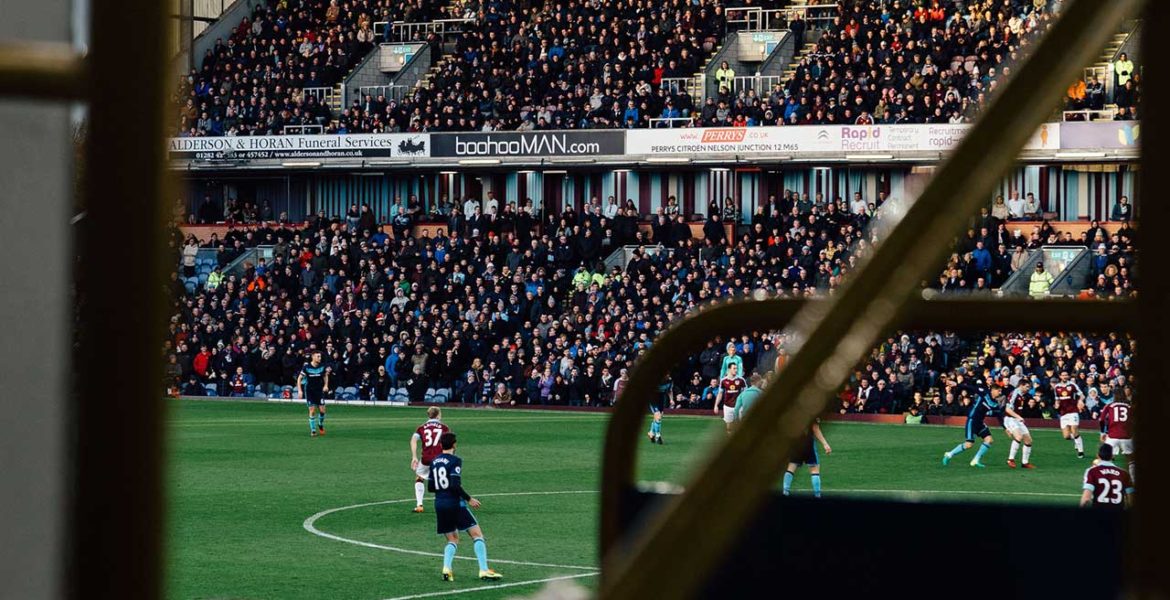With matches canceled or played in front of empty stadiums, let’s create digital experiences that sports fans didn’t even know existed.
There are few things in the current situation that have had a huge impact on daily life and a sense of community a lot of people experience. One example: almost all live sports tournaments are canceled or postponed. This ranges from amateur competitions to huge tournaments. Today, UEFA announced that even more games are postponed, and instead of the previously reported deadline of June 30th, all leagues are postponed indefinitely.
I’ve spent a large part of my career reporting on football. I’ve covered everything from the national leagues to the English National Team during the World Cup in South Africa. With my big switch, moving into marketing, I exchanged the adrenaline rush of live coverage to the similar rush of pitching. But, if I’m honest, nothing will ever be able to compete with experiencing a moment that you share with millions of others, at the same time.
Now arenas all over the world are silent and empty, sports journalists are moved to news desks to report on other things, and for the fans, there’s not much to do but revisit old nostalgia. For many, whether they are fans, or professionals working in the sports industry, this is a huge blow, in a time when the kind of entertainment that sport is providing us with, is what we need the most.
To replace games and competitions with any other content is impossible. Exclusive interviews and documentary material that we usually turn to during off-season is impossible to produce, due to travel restrictions and social distancing. But when supporters are choosing what nostalgic moment to watch again (and again, and again…), athletes are in the same situation of quarantine and boredom. They’ve lost their main purpose, their stage, and their audience. And they have so much time to kill.
Right now, football clubs, associations, and sponsors are doing everything they can to fill the need of content as they aim to use the athletes freed up time and to keep the engagement from their supporters alive.
The situation is unique, and rather than asking ourselves the question of how to survive this period, we also need to critically look at the following: are we making enough efforts to make use of the situation we are presented with?
What we see is that some have invited fans to hangouts with football stars, commercials based on athletes’ lives in quarantine are being made, and a steady stream of new content on social media is providing more access to star players’ private lives. But there’s so much more to be done.
I appreciate seeing stars having kids hanging around. To get a sneak peek of their kitchen and witness their fighting face while playing video games. But this isn’t what will create a new way of connecting, nor will it create an exclusive form of entertainment. And to make a difference as a sports brand, a club, association or sponsor: that’s the next step. And the digital industry can help.
Online game Fortnite arranged a concert with the DJ Marshmello, 10,7 million attended in the game, 27 million saw it on YouTube. A Japanese school class created a world inside the game Minecraft, to meet and celebrate their exam when this wasn’t possible in real life because of quarantine. These are just two examples of how digital experiences can be used as a great facilitator to find new ways to meet and share experiences.
But in the same way as a Champions League game is a bigger arrangement than a Division 2 match – there’s more to creating a digital experience than a decent WIFI connection and a live-streamed Q&A.
The possibilities are endless if the effort is there. You could create a custom-made digital layer, to make the audience and stars connect in unexpected and interesting ways. With augmented reality, you can create playful experiences for fans and players to share in the same digital space. Everyone could meet in a virtual reality world, with new features and an experience that’s incredibly close to sharing a physical space.
This is only the start of many more interesting possibilities while we’re in this strange vacuum. Times are very uncertain for everyone involved in the business of live sport, and it’s not hard to understand why many stakeholders are waiting around to see what’s going to happen. But just waiting for everything to go back to normal, means that we might be missing out on a tremendous possibility to innovate and create a digital space for live sports that people will grow to love. When every report is telling us that new, more digital, habits are created at this very moment – why not make sure to create a new way of entertainment to meet the new needs?
I’m certain that for me, and all fellow fans, the grass will smell better, the excitement will be stronger and the live match experience more thrilling than ever when football is back. But I’m equally certain that there are new ways to create connection and intimacy for football’s strongest ambassadors and the huge target group that is their fans.
Those who will invest in developing those possibilities now will also be able to offer a kind of entertainment that will give the connection between sports and their fans a new dimension. Something that will last way beyond the COVID-19 crisis.
Let’s make sure we make the most of it – and create experiences that sports fans didn’t even know existed.

